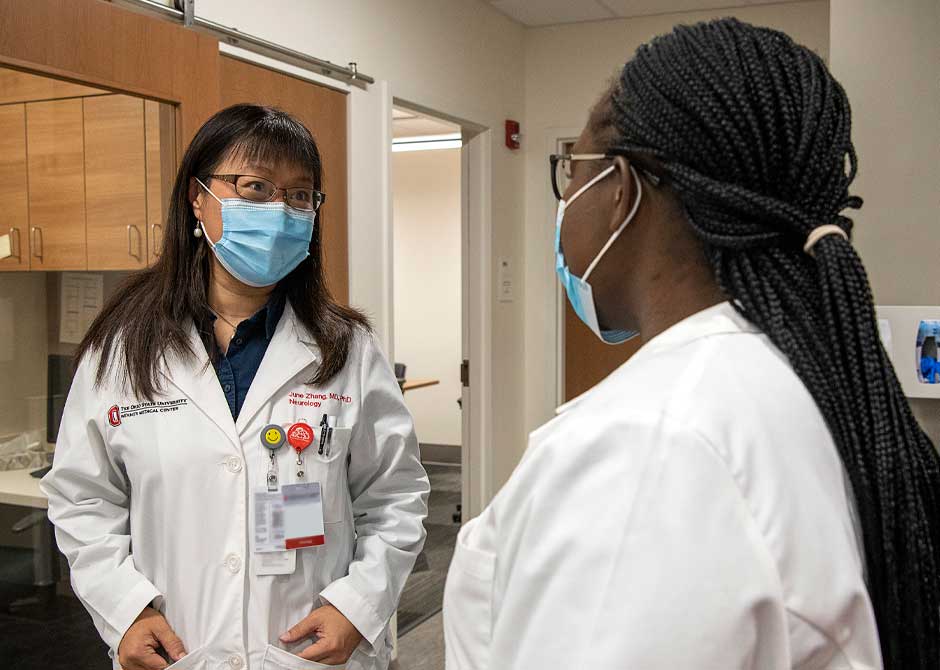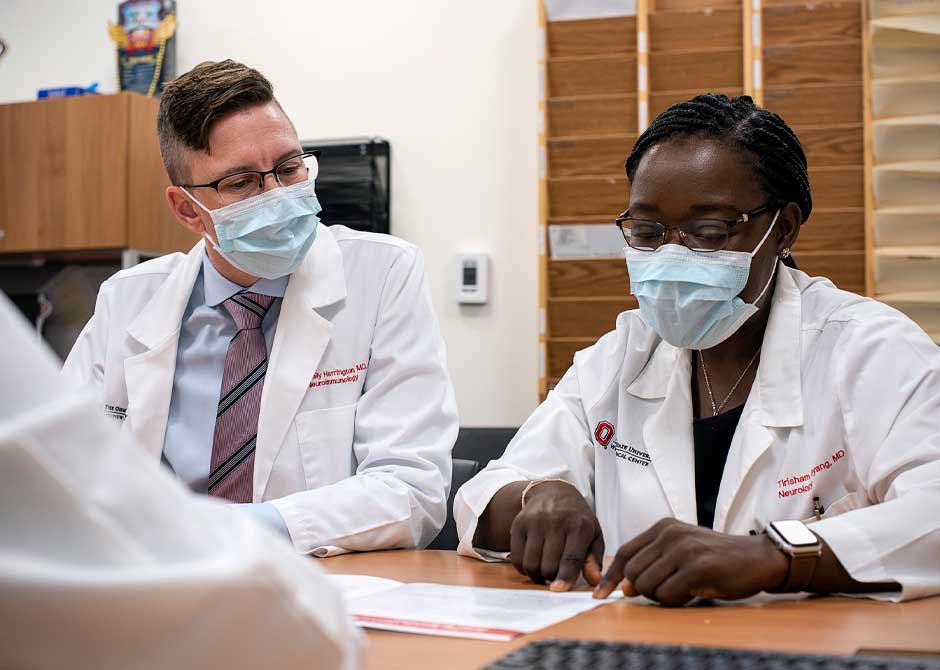Treatment can make living with multiple sclerosis (MS) easier. Some drugs (called “disease-modifying”) make it less likely that a patient will have a future MS attack or develop new lesions. In some cases, disease-modifying drugs have also been shown to slow progressive MS symptoms.
 Your type of treatment will depend on the type of MS that you have, whether your disease is active or in remission and the types of symptoms you’re experiencing. Your care provider may prescribe medicines, physical therapy, speech therapy and other treatments you can do at home. To optimize your care, you may be referred to another specialist, such as a urologist to help manage bladder symptoms, a nutritionist to make dietary recommendations, an ophthalmologist to help diagnose and manage visual deficits, a physical medicine and rehabilitation expert to design a personalized stretching and exercise program or a pain specialist.
Your type of treatment will depend on the type of MS that you have, whether your disease is active or in remission and the types of symptoms you’re experiencing. Your care provider may prescribe medicines, physical therapy, speech therapy and other treatments you can do at home. To optimize your care, you may be referred to another specialist, such as a urologist to help manage bladder symptoms, a nutritionist to make dietary recommendations, an ophthalmologist to help diagnose and manage visual deficits, a physical medicine and rehabilitation expert to design a personalized stretching and exercise program or a pain specialist.
These medicines and treatments are used to manage MS:
- High-dose steroids are sometimes administered during a relapse to make the attack shorter and less severe. Steroids can be given by vein or in pill form, generally over a span of three to five days. For patients with particularly severe attacks who don’t respond to steroids, a procedure called therapeutic plasma exchange (referred to as TPE or PLEX) may be prescribed. During plasma exchange, a patient’s blood is passed through a filtering device to remove toxic agents.
- Disease-modifying therapies are given over long periods of time to patients with clinically isolated syndrome (CIS), relapsing-remitting MS (RRMS) or active secondary progressive MS (SPMS) to suppress MS attacks and to minimize future neurological disability. Certain disease-modifying therapies may be indicated in individuals with primary progressive MS (PPMS) who are younger or have evidence of active (inflammatory) disease.
- Symptomatic treatments are prescribed to control or alleviate symptoms and improve quality of life. These include drugs, physical therapy, speech therapy, cognitive rehabilitation and assistive devices.
- You and your doctor will decide together if and when you should start any of these treatments.
Disease-modifying therapies
Your doctor may prescribe a disease-modifying drug depending on the type of MS you have, your symptoms, your sensitivity to potential side effects and how your body responds. There are now at least 15 drugs used to decrease the risk of future MS attacks and worsening neurological disability. They include:
Self-injectable medications:
- Interferon beta-1a (Avonex, Rebif, Plegridy)
- Interferon beta-1b (Betaseron, Extavia)
- Glatiramer acetate (Copaxone, Glatopa)
Oral medications:
- Dimethyl fumarate (Tecfidera)
- Diroximel fumarate (Vumerity)
- Fingolimod (Gilenya)
- Siponimod (Mayzent)
- Ozanimod (Zeposia)
- Cladribine (Mavenclad)
- Teriflunomide (Aubagio)
Infused medications:
- Natalizumab (Tysabri)
- Ocrelizumab (Ocrevus)
- Alemtuzumab (Lemtrada)
- Rituximab (Rituxan)
Symptomatic treatment
Treating specific symptoms can alleviate suffering and improve quality of life. Symptoms that are often controlled or relieved with medicine include:
- Fatigue
- Muscle stiffness (spasticity)
- Urinary urgency or hesitancy
- Constipation
- Pain and abnormal sensations
- Depression
- Sexual problems
- Emotional problems
- Walking problems
Medicine may be used only some of the time or regularly, depending on how severe or constant a certain symptom is. Changes in diet, routine, exercise and other habits can also help manage some of these symptoms.
Rehabilitative interventions are often employed in combination with medicines. Physical therapy, occupational therapy and speech therapy can help you manage some physical problems caused by MS. The Ohio State University Wexner Medical Center’s Physical Therapy and Rehabilitation Department offers MS-specific therapies such as aqua therapy in our pools, assistive device therapy, cognitive rehabilitation and assistance with driving tests. We have a dedicated team of MS-trained and specialized physical therapists in multiple locations to fit your individual needs.
Our specialty clinics manage MS
 Due to the complexity and diversity of MS, we’ve developed a number of specialty clinics to help us create a personalized plan for you by understanding your symptoms, determining your challenges and setting personal goals.
Due to the complexity and diversity of MS, we’ve developed a number of specialty clinics to help us create a personalized plan for you by understanding your symptoms, determining your challenges and setting personal goals.
Care can be coordinated to include visits with physical therapists, speech therapists, fatigue and sleep disorder specialists, neuropsychologists, psychiatrists, pain experts, urologists and other specialists as needed.
Some of the clinics are more general while others cover specific areas of multiple sclerosis and similar diseases you might be experiencing.
- Quality of Life Multiple Sclerosis Clinic – This clinic provides a great first step into understanding how our team of specialists can improve areas of your life impacted by MS. We’ll start by gathering some baseline diagnostic tests, have you fill out a questionnaire about the impact of MS on your lifestyle, and discuss your short-term and long-term goals. In addition we will cover important disease basics, complete symptom assessment and discuss recommended diet, supplement and exercise regimens. Based on individual needs determined at this visit we can refer you to other specialty MS clinics or specialists in areas such as physical therapy, urology, talk therapy and sleep medicine.
- Multiple Sclerosis Sleep/Fatigue Clinic – Fatigue is the most common symptom reported by patients with MS so we created this program to help you manage this issue. We’ll determine if you might benefit from a sleep study or further investigation and create a customized treatment plan to help you sleep better and have more energy.
- Multiple Sclerosis Psychotherapy Clinic – Adjusting to life with a chronic illness can be difficult. In this clinic, you’ll receive evidence-based psychotherapy with a clinical psychologist to address a wide range of issues, including adjustment to chronic illness and disability, depression and anxiety symptoms and fatigue. Treatment is individualized to fit your unique needs but will broadly focus on learning new coping strategies for addressing symptoms and enhancing quality of life.
- Multiple Sclerosis and Neuroimmunology Preconception Planning and Pregnancy Clinic - In this clinic, we offer pre-pregnancy counseling, monitoring during pregnancy, and guidance with symptomatic management during pregnancy and the post-partum period. Our preconception clinic focuses on preparing the patient for pregnancy, including a review of current medications and plans for continuation or change in disease modifying therapy (if indicated). During pregnancy, we monitor for possible relapse, discuss current symptoms and/or concerns. Last, we discuss breastfeeding goals and medication options available while breastfeeding. In the postpartum clinic, we focus on breastfeeding and symptomatic management following delivery.
- Multiple Sclerosis Multidisciplinary Symptom Management Clinic – This clinic is staffed by a team of specialists that evaluates and treats a range of MS-related symptoms, including fatigue, mood disorders, cognitive and memory issues, spasticity, imbalance and unsteady or labored gait, weakness, incoordination, speech and swallowing difficulties, pain and bladder dysfunction. Addressing these symptoms and providing education about lifestyle changes can positively affect quality of life.
- Neurosarcoidosis Clinic – People at this clinic will be seen by specialists in neuroimmunology and in pulmonary medicine. We work to provide care and innovative research to better understand and treat neurosarcoidosis, which is characterized by inflammation and abnormal cell deposits in the nervous system.
- Neuro-Rheumatology Clinic – For those suffering from neurological-based inflammatory and rheumatologic disorders, this program gives you access to neuroimmunology and rheumatology clinicians. Disorders seen in this clinic include certain types of lupus and Sjogren’s syndrome, MS, vasculitis and connective tissue disorder.
- Aging with Multiple Sclerosis – The Aging with MS clinic provides comprehensive care for older adults with MS who are uniquely affected by overlapping symptoms of aging and MS. Our multidisciplinary team of specialists manages issues related to functional capacity, gait and balance, bladder function, nutrition, cognition, mood, social support and medications. Our goal is to improve quality of life and prevent disability in older adults with MS through multidisciplinary care in geriatric neurology.
A referral may be required to be seen at these clinics. Talk to your doctor about how to get started.

